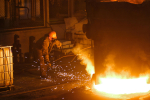My thoughts in The Chemical Engineer on how the hydrogen economy might develop:
https://www.thechemicalengineer.com/features/ban-the-steam-engine-and-build-ten-hinkleys/
Extract:
“It's a bit like saying we're banning the sale of steam engines”. Thus observed Aston Business School professor David Bailey in response to the UK government’s 2040 ban on “new conventional petrol and diesel cars and vans.” Whilst initial media coverage saw this as highly momentous, the reality might prove somewhat different. As products improve and prices fall, the take-up of petrol-electric hybrids and 'pure' electric vehicles (EVs) might come much sooner. Today’s ‘conventionals’ will become obsolete long before they’re banned.
But leaping on the (low emissions) bandwagon creates new issues. Even if we all find somewhere to plug in, doing so risks chaos. National Grid’s Future Energy Scenarios top-end case adds 30 GW to current peak demand, equivalent to ten Hinkley Point C nuclear power stations. (And, incidentally, baseload nuclear remains a key part of the mix, irrespective of the arguments below.)
Then, even after hours of recharging, can EV batteries provide sufficient driving range? Meanwhile, renewable energy costs (especially offshore wind) are plummeting. But a new barrier to progress is fast emerging: the challenge of balancing further intermittent (i.e. unreliable) grid suppliers.
Part of the solution could involve hydrogen. As we’re about to see, technical and economic hurdles still remain. But the gaps it potentially addresses and the progress seen already suggests it merits some consideration. Let’s start by understanding what it might offer.

